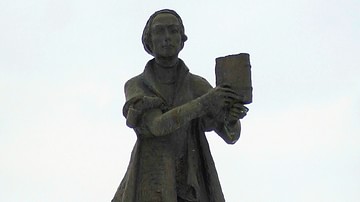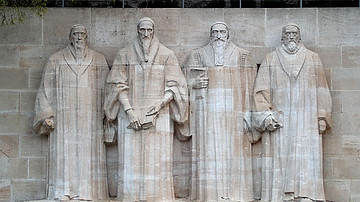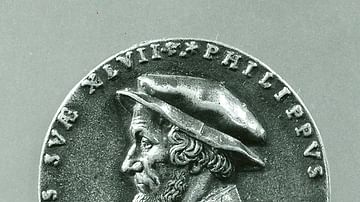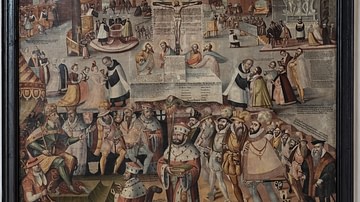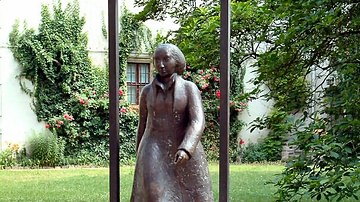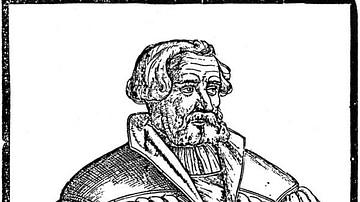To the University of Ingolstadt (1523) is an open letter by the German reformer Argula von Grumbach (l. 1490 to c. 1564) protesting the dismissal, arrest, and imprisonment of the young scholar Arsacius Seehofer (l. c. 1504 to c. 1539) for teaching Lutheran beliefs at the school. The university ignored the letter, but it was printed and became a bestseller.
Argula von Grumbach (nee von Stauff) came from an upper-class Bavarian family who rejected the standard belief of the time that teaching women to read would only confuse them and lead them into sin. Argula's father made sure all his children were well-educated and gave her a Bible when she was ten years old. She converted to Lutheranism in 1522 after reading the works of Martin Luther (l. 1483-1546) and Philip Melanchthon (l. 1497-1560). When Seehofer was arrested, no one protested, and so she wrote her now-famous letter in response.
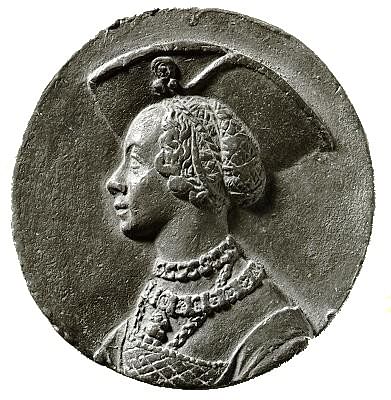
The university faculty refused to enter into debate with a woman, and so she had the letter published, establishing her as a popular reformist writer. Her later pamphlets went through numerous printings, circulating in upwards of 30,000 copies at one point, and helped spread the vision of the Protestant Reformation throughout Germany.
Background
Martin Luther's 95 Theses had been issued in October 1517, and he had already made his famous speech at the Diet of Worms in 1521 when Arsacius Seehofer, a student at the University of Ingolstadt, Munich, came to Wittenberg to study with Luther's right-hand man, Melanchthon. Seehofer had been enrolled at Ingolstadt since 1518 but, as Luther's Reformation took hold in Germany, the Catholic theologian Johann Eck (l. 1486-1543), instituted strict rules at the university to bar Luther's teachings. Like all universities prior to the Reformation, Ingolstadt was founded on Catholic principles and advanced the Catholic understanding of Christianity.
Once the Reformation was underway, it took hold at several universities throughout Germany, and Eck wanted to make sure this did not happen at Ingolstadt. Faculty was forbidden to teach Luther's views, and his works were banned. It is unclear why Seehofer traveled to Wittenberg, but, most likely, it was specifically to hear the Reformed teachings prohibited at Ingolstadt. When he returned to school in the fall of 1522, he was warned by Eck not to engage with Lutheran doctrine, but in the spring of 1523, as a member of the faculty, he delivered a lecture on Melanchthon's views.
Seehofer was censured, and when his apartment was searched, 17 Lutheran documents were seized. He was arrested and imprisoned in Ettal Abbey and threatened with burning at the stake unless he renounced Luther's teachings, which he did (though insincerely, since he later became a Protestant preacher and teacher after his release). Argula von Grumbach, by this time a devoted follower of Luther and Melanchthon, was deeply disappointed that no men were stepping forward to protest Seehofer's imprisonment, and so she took it upon herself to write her now-famous letter.
The Text
The following text is shortened for considerations of space, missing lines indicated by ellipses, and taken from Additional Primary Readings for A Reformation Reader, edited by S. E. Jordon.
The account of a Christian woman of the Bavarian nobility whose open letter, with arguments based on divine Scripture, criticizes the University of Ingolstadt for compelling a young follower of the gospel to contradict the word of God...
The Lord says, John 12, "I am the light that has come into the world, that none who believe in me should abide in darkness." It is my heartfelt wish that this light should dwell in all of us and shine upon all callous and blinded hearts. Amen.
I find there is a text in Matthew 10 which runs: "Whoever confesses me before another, I too will confess before my heavenly Father." And Luke 9: "Whoever is ashamed of me and of my words, I too will be ashamed of when I come in my majesty," etc. Words like these, coming from the very mouth of God, are always before my eyes. For they exclude neither woman nor man.
And this is why I am compelled as a Christian to write to you. For Ezekiel 33 says: "If you see your brother sin, reprove him, or I will require his blood at your hands." In Matthew 12, the Lord says, "All sins will be forgiven; but the sin against the Holy Spirit will never be forgiven, neither here nor in eternity." And in John 6, the Lord says: "My words are spirit and life..."
How in God's name can you and your university expect to prevail, when you deploy such foolish violence against the word of God; when you force someone to hold the holy Gospel in their hands for the very purpose of denying it, as you did in the case of Arsacius Seehofer? When you confront him with an oath and declaration such as this, and use imprisonment and even the threat of the stake to force him to deny Christ and his word?
Yes, when I reflect on this, my heart and all my limbs tremble. What do Luther or Melanchthon teach you but the word of God? You condemn them without having refuted them. Did Christ teach you so, or his apostles, prophets, or evangelists? Show me where this is written! You lofty experts, nowhere in the Bible do I find that Christ, or his apostles, or his prophets put people in prison, burnt or murdered them, or sent them into exile...Don't you know what the Lords says in Matthew 10? "Have no fear of him who can take your body but then his power is at an end. But fear him who has power to dispatch soul and body into the depths of hell."
One knows very well the importance of one’s duty to obey the authorities. But where the word of God is concerned, neither Pope, Emperor, nor princes – as Acts 4 and 5 make so clear – have any jurisdiction. For my part, I have to confess, in the name of God and by my soul’s salvation, that if I were to deny Luther and Melanchthon's writing, I would be denying God and his word, which may God forfend forever. Amen...
I beseech you. Trust in God. He will not desert us, for every hair on our heads is numbered and in his care, as Matthew 10 says. I had to listen for ages to your Decretal preacher crying out in the Church of Our Lady: Ketzer! Ketzer!, "Heretic, Heretic!" Poor Latin, that! I could say as much myself, no doubt, and I have never been to university. But if they are to prove their case, they'll have to do better than that. I always meant to write to him, to ask him to show me which heretical articles the loyal worker for the Gospel, Martin Luther, is supposed to have taught.
However, I suppressed my inclinations; heavy of heart, I did nothing. Because Paul says in I Timothy 2: "The women should keep silence and should not speak in church." But now that I cannot see any man who is up to it, who is either willing or able to speak, I am constrained by the saying, "Whoever confesses me," as I said above. And I claim for myself Isaiah 3: "I will send children to be their princes; and women, or those who are womanish, shall rule over them..."
My heart goes out to our princes, whom you have seduced and betrayed so deplorably. For I realize that they are ill informed about divine Scripture. If they could spare the time from other business, I believe they, too, would discover the truth that no one has a right to exercise sovereignty over the words of God. Yes, no human being, whoever he be, can rule over it. For the word of God alone – without which nothing was made – should and must rule...
What have our princes done to merit such conduct from you? Is this the reward for their frequent generosity, bestowing wealth on the poor among you? How do you make them look? Why do you make them and this university of yours, which they are rightly praised for founding, the laughingstock of the whole world? Ah, what loyalty you return for the good they have done you! What gratitude! How dare you?...
I am quite convinced that, if they knew the truth, they would not continue to act on your requests as they have now done with Seehofer and would not have given permission for him to be murdered, as indicated in his oath. May God be their reward eternally. I hope things will improve. Who knows why they gave such an instruction?
Have no doubt about this: God looks mercifully on Arsacius, or will do so in the future, just as he did on Peter, who denied the Lord three times. For each day the just person falls seven times and gets up on his feet again. God does not want the death of the sinner, but his conversion and life. Christ the Lord himself feared death; so much so that he sweated a bloody sweat. I trust that God will yet see much good from this young man. Just as Peter, too, did much good work later, after his denial of the Lord. And, unlike this man, he was still free, and did not suffer such lengthy imprisonment, or the threat of the stake...
Are you not ashamed that Seehofer had to deny all the writings of Martin, who put the New Testament into German, simply following the text? That means that the holy Gospel and the Epistles and the story of the Apostles and so on are all dismissed by you as heresy. It seems there is no hope of a proper discussion with you. And then there's the five books of Moses, which are being printed too. Is that nothing? I hear nothing about any of you refuting a single article of Arsacius from Scripture...
I beseech you for the sake of God, and exhort you by God's judgement and righteousness, to tell me in writing which of the articles written by Martin or Melanchthon you consider heretical. In German, not a single one seems heretical to me. And the fact is that a great deal has been published in German, and I've read it all. Spalatin sent me a list of all the titles. I have always wanted to find out the truth...My dear lord and father insisted on me reading [the Bible] when I was ten years old. Unfortunately, I did not obey him, being seduced by the afore-named clerics, especially the Observants who said that I would be led astray.
Ah, but what a joy it is when the spirit of God teaches us and gives us understanding, flitting from one text to the next – God be praised – so that I came to see the true, genuine light shining out. I don't intend to bury my talent if the Lord gives me grace. "The gospel," says Christ, Luke 7, "is preached to the poor, and blessed is the one who is not offended by me..."
I cry out with the prophet Jeremiah, chapter 22: "Earth, earth, earth! Hear the word of the Lord!" I beseech and request a reply from you if you consider that I am in error, though I am not aware of it. For Jerome was not ashamed of writing a great deal to women, to Blesilla, for example, to Paula, Eustochium, and so on. Yes, and Christ himself, he who is the only teacher of us all, was not ashamed to preach to Mary Magdalene, and to the young woman at the well.
I do not flinch from appearing before you, from listening to you, from discussing with you. For by the grace of God I, too, can ask questions, hear answers, and read in German. There are, of course, German Bibles which Martin has not translated. You yourselves have on which was printed forty-one years ago, when Luther’s was never even thought of.
If God had not ordained it, I might behave like the others, and write or say that he perverts Scripture; that is contrary to God's will. Although I have yet to read anyone who is his equal in translating it into German. May God, who works all this in him, be his reward here in time and in eternity. And even if it came to pass – which God forfend – that Luther were to revoke his views, that would not worry me. I do not build on his, mine, or any person's understanding, but on the true rock, Christ himself, which the builders have rejected. But he has been made the foundation stone and the head of the corner, as Paul says in I Corinthians 3: "No other base can be laid, than that which is laid, which is Christ..."
I have no Latin; but you have German, being born and brought up in this tongue. What I have written you is no woman's chit-chat, but the word of God; and I wrote as a member of the Christian Church, against which the gates of Hell cannot prevail. Against the Roman, however, they do prevail. Just look at that church! How is it to prevail against the gates of Hell? God give us his grace, that we all may be saved, and may God rule us according to His will. Now may his grace carry the day. Amen.
Dietfurt. Sunday after the exaltation of the holy Cross. The year of the Lord One thousand five hundred and in the twenty-third year. My signature, Argula von Grumbach, von Stauff by birth.
To the reverent, honorable, well-born, most learned, noble and esteemed Rector and general council of the whole University of Ingolstadt.
Conclusion
Johann Eck and the faculty of Ingolstadt ignored von Grumbach's letter, and Seehofer remained imprisoned. She then had the letter published and, as Protestant works were popular reading at this time (because they challenged traditional authority), it became a bestseller. Perhaps, if they had not dismissed her as just a woman who had no business telling them what to do, the faculty would not have had to face the public embarrassment of a woman, who had never attended university, showing she knew scripture as well as they.
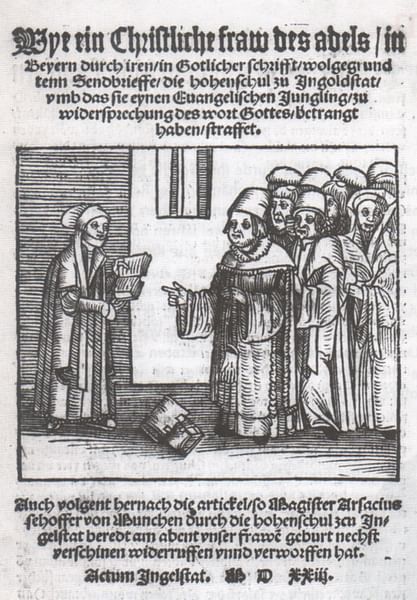
Seehofer was set free in 1524 and became a teacher and pastor, but how much von Grumbach's letter had to do with his release is unclear. Her success with To the University of Ingolstadt encouraged her to write more works, however, and at one point over 30,000 of her pamphlets were in circulation. The authorities encouraged her Catholic husband, Friedrich von Grumbach (d. 1530) to silence her, suggesting he break her hands, and assured him there would be no consequences if she should murder her. Friedrich ignored these suggestions, was fired from his position, and the family was banished from their home in Dietfurt, but Argula continued to advocate for the Reformation, even though she was frequently persecuted and struggled financially.
Although at first ignored and then villainized by Catholic authorities, Argula von Grumbach never stopped writing, preaching, and teaching until her death c. 1564. She met Luther and later Melanchthon at Augsburg in 1530 and traveled alone to Nuremberg to advance the Reformation. Today she is regarded as one of the great voices of the movement, and her letter to the Ingolstadt faculty is considered one of the most significant among early Reformation writings.
